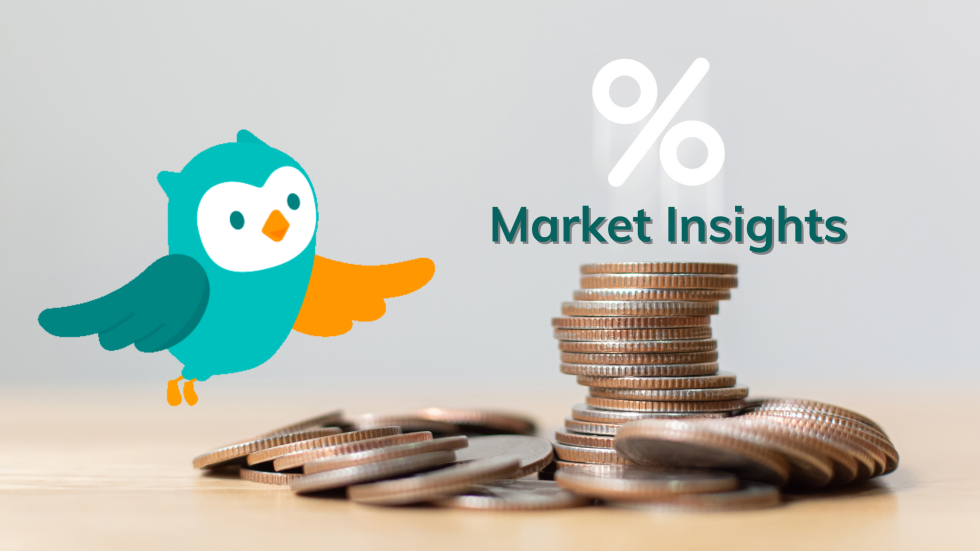Note: It was announced in November 2023 that MoneyOwl will be acquired by Temasek Trust to serve communities under a re-purposed model, and will move away from direct sale of financial products. The article is retained with original information relevant as at the date of the article only, and any mention of products or promotions is retained for reference purposes only.
______________
Have you ever wondered about the effect of election results on your investments? Our Investment Team shares their findings.
(14 November 2022 – 18 November 2022)
Global equities experienced a small decline last week, failing to maintain the strong positive momentum from the previous week. The S&P 500 and MSCI World Index declined 0.69% and 0.57% respectively, while MoneyOwl’s 100% equity portfolio was down 0.65%. In fixed income, a drop of 7bps in the benchmark US 10-year Treasury yield to 3.83% helped to support bond prices and the Bloomberg Barclays global aggregate bond index rose 1.32% over the week.
Despite a drop in the benchmark Treasury yield last week, concerns about the pace of further US interest rate increases remained top of mind for investors amid fresh data on US price inflation and retail sales.
US Mid-Term Election Outcome
On Wednesday, the US revealed that the Republicans have won control of the US House of Representatives. US Presidential elections attract global attention every four years, but what happens in the midterm elections – which come nearly two years into a president’s term — can have just as big an impact on the direction of the country.
Considering that the US economy has the highest weightage in most global portfolios, including those offered by MoneyOwl, you may wonder about the effect of election results on your investments. Do past results suggest a useful strategy to deal with election-year uncertainty? The answer is yes.
For the 96-year period ending in 2021, the S&P 500 Index (with dividends reinvested) posted an average return of 12.33% for all calendar years and results were negative in roughly one out of four years. During that time, there were 24 midterm congressional elections where the average return for the 12-month period following the election was significantly higher at 19.58%, with only one negative result.

There is a distinction between the decisions we make as voters and those we make as consumers. Voters express their opinion at the midterm ballot box once every four years, while consumers express them at the cash register every day by deciding which products and services to buy. We may have firmly held opinions regarding politics and policy, but we don’t invest in 535 men and women gathering in Washington D.C for the election.
Instead, we invest in companies located globally in developed and emerging markets. It is undeniable that government policies impact economies, but the men and women running these firms face challenges and opportunities from dozens of factors.
Ford CEO, Jim Farley has to juggle resources at Ford Motor to maintain the F-150 pickup truck as the best-selling vehicle in the country while investing in new technology to power models with electric motors. Disney’s CEO, Bob Iger has to decide how much of Disney shareholders’ money should be spent on new cruise ships and how much on movies.
Are these CEOs concerned with election results? Quite possibly yes. But they are likely to be far more concerned with a host of other issues while directing organizations with operations and employees around the world. The same goes for the thousands of other companies, large and small, across the world as they look for ways to maximize profits for shareholders.
Tesla made its initial public offering of shares in 2010 priced at $17. Adjusted for two stock splits, the shares were valued at $3,346 on October 7, 2022. Was Tesla’s success a result of generous government tax credits to electric vehicle buyers, or its ability to produce and sell nearly one million vehicles a year despite no previous manufacturing experience? Or some combination of both?
Many investors have firm convictions regarding politics, and a healthy democracy depends on active citizen participation. But predicting election outcomes is difficult, and predicting how securities markets will react to those outcomes is even harder. Did anyone predict that Joe Biden would be elected president and that the US stock market would have its strongest election week results since 1932? The takeaway— as Dimensional Fund Advisor founder David Booth said it best: Vote with your ballot. Not your life savings
China Covid-Zero and Rebound
Last week China issued sweeping relaxation measures on property and Covid controls, in the strongest signal yet that President Xi Jinping is now turning his attention to rescuing the economy. Beijing unveiled an extensive 16-point rescue package for the struggling real estate market, just days after announcing 20 measures to guide officials as it eases its contentious Covid-Zero policy. The major policy shifts will likely aid China’s growth outlook and add fuel to a market rally that sent a gauge of Chinese shares in Hong Kong up 17% in the past two weeks.
No Crypto
Institutional investors were souring on cryptocurrencies even before Sam Bankman-Fried’s FTX.com crumbled. Now their prospects of ever being included in mainstream portfolios may be dead in the water. While plenty of industry die-hards remain, many professional money managers are saying the case for crypto as a portfolio diversifier or digital gold has been debunked as the losses are too great and the market structure is too risky. With FTX now facing a criminal misconduct probe, the big question right now is, will its customers get their money back? The answer remains a nightmarish ‘unlikely’.
Slower Fed?
Federal Reserve Vice Chair Lael Brainard said the central bank could soon moderate its interest rate increases, signalling that she favours slowing to a half-point hike as early as next month. “It will probably be appropriate soon to move to a slower pace of increases,” Brainard said Monday in a fireside-chat event at Bloomberg’s Washington bureau, even as she acknowledged that the central bank has “additional work to do.” Investors expect Fed officials to opt for a half-point hike at their December 13-14 meeting.
Out of Bounds
Explosions reportedly caused by Russian missiles killed two people in Poland, prompting the NATO member to consider an appeal for assistance from its allies on grounds of national security. Polish authorities are investigating the blasts that happened about 6 kilometres (4 miles) from the frontier with Ukraine. Doubts are growing over the rocket’s origin and whether it was fired by accident, with some leaders suggesting it could have been Ukraine’s missile defence sending a Russian projectile off course. Multiple diplomats say it’s looking less likely that Poland will invoke Article 4 of the NATO charter, which would kick off a discussion with the alliance ahead of any potential response.
Read more Market Insights here.

Consider parking your emergency funds in MoneyOwl’s WiseSaver, a cash management account now at an attractive gross yield of 4.12% p.a. (5-day moving average as of 3 November 2023).
Disclaimer: While every reasonable care is taken to ensure the accuracy of the information provided, no responsibility can be accepted for any loss or inconvenience caused by any error or omission. The information and opinions expressed herein are made in good faith and are based on sources believed to be reliable but no representation or warranty, express or implied, is made as to their accuracy, completeness or correctness. Expressions of opinions or estimates should neither be relied upon nor used in any way as an indication of the future performance of any financial products, as prices of assets and currencies may go down as well as up and past performance should not be taken as an indication of future performance. The author and publisher shall have no liability for any loss or expense whatsoever relating to investment decisions made by the reader.
Follow MoneyOwl on social media for more awesome content on investments, insurance, and financial planning!





